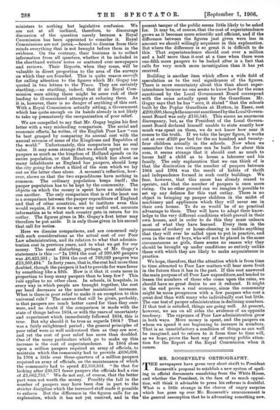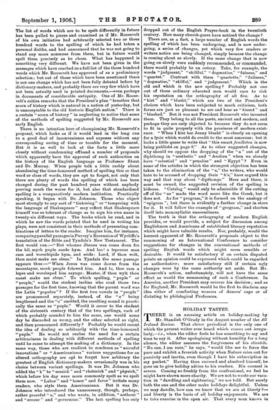MR. ROOSEVELT'S ORTHOGRAPHY. T HE newspapers have given very short shrift
to President Roosevelt's proposal to establish a new system of spell- ing in official documents emulating from the White House, and whether the President, in the face of so much opposi- tion, will think it advisable to press his reforms is doubtful. What is a little strange in the chorus of angry surprise which has gone up over Mr. Roosevelt's announcement is the general assumption that he is advocating something new. The list of words which are to be spelt differently in future has been pulled to pieces and examined as if Mr. Roosevelt of his own initiative had arbitrarily selected two or three hundred words to the spelling of which he had taken a personal dislike, and bad announced that be was not going to stand any more nonsense from them, but in future would spell them precisely as he chose. What has happened is something very different. We have not been given in the messages which have reached us a full list of the three hundred words which Mr. Roosevelt has approved of as a preliminary selection; but out of those which have been mentioned there is not one change which has not been fully debated before by dictionary-makers, and probably there are very few which have not been actually used in printed documents,—even perhaps in documents of considerable antiquity. One of Mr. Roose- velt's critics remarks that the President's plan "breathes that scorn of history which is natural in a nation of yesterday, but is unacceptable to the old historic English nation." There is a certain "acorn of history" in neglecting to notice that some of the methods of spelling suggested by Mr. Roosevelt are early English.
There is no intention here of championing Mr. Roosevelt's proposal, which looks as if it would lead in the long run to a good deal of inconvenience and expense without any corresponding saving of time or trouble for the moment. But it is as well to look at the facts a little more closely without condemning offhand a number of proposals which apparently have the approval of such authorities on the history of the English language as Professor Skeet and Dr. Murray. When people talk a little rashly about abandoning the time-honoured method of spelling this or that word or class of words, they are apt to forget, not only that there are plenty of words the spelling of which has been changed during the past hundred years without anybody proving much the worse for it, but also that standardised spelling is a comparatively modern institution. Practically speaking, it began with Dr. Johnson. Those who object most strongly to any sort of "tinkering" or "tampering with the language of 'Shakespeare" may reflect that Shakespeare himself was so tolerant of change as to sign his own name in twenty-six different ways. ,The books which he read, and in which he saw the words printed that he used in writing his plays, were not consistent in their methods of presenting com- binations of letters to the reader. Imagine him, for instance, comparin g parallel passages in Purvey's Recension of Wycliffe's translation of the Bible and Tyndale's New Testament. The first would run :—" But whanne Mesas was come doun fro the bil, mych puple suede hym. And loo ! a leprouse man cam and worschipide hym, and seide: Lord, if thou wolt, thou maist make me clene." In Tyndale the same passage appears thus :—" When Jesus was come downe from the mountayne, moch people folowed him. And lo, ther cam a lepre and worsbeped him say-nge : Master, if thou wylt thou canal make me clene." To which spelling, " puple " or "people," would the student incline who read those two passages for the first time, knowing that the parent word was the Latin "populus" ? If the first two vowels in " people " are pronounced separately, instead, of the " e " being lengthened and the "o" omitted, the resulting sound is practi- cally the same as " puple." Would it occur to the student of the sixteenth century that of the two spellings, each of which probably sounded to him the same, one would some day be discarded as wrong, and the other selected as right, and then pronounced differently F Probably he would resent the idea of dealing so arbitrarily with • the time-honoured " puple." He would not realise the need for a certain arbitrariness in dealing with different methods of spelling until he came to attempt the making of a dictionary. In the same way, those who are readiest to condemn as "scornful innovations" or "Americanisms" various suggestions for an altered orthography are apt to forget how arbitrary the greatest of English dictionary-makers occasionally was in his choice between variant spellings. It was Dr. Johnson who added the "k" to " musick " and " rhetorick " and " physick," which before his day were more commonly spelt as we spell them now. " Labor " and "honor" and favor" irritate many readers, who style them Americanisms. But it was Dr. Johnson who introduced the unnecessary, though, perhaps, rather graceful "u," and who wrote, in addition, " authour " and " errour" and " governour." The last spelling has only
dropped out of the English Prayer-book in the twentieth century. How many church-goers have noticed the change ?
There are, as a fact, a large number of English words the spelling of which has been undergoing, and is now under- going, a series of changes, yet which very few readers or writers notice are being changed, simply because the change is coming about so slowly. If the same change that is now going on slowly were suddenly recommended, or commanded, there would probably be an outcry. Take, for example, the words "judgment," "skillful," "dogmatize," "fulness," and "quartet." Contrast with them "quartette," "fullness," "dogmatise," "skilful," and "judgement." Which is the old and which is the new spelling ? Probably not one out of three ordinary educated men would care to risk his reputation on the orthography of all five. As to " kist" and " blusht," which are two of the President's choices which have been subjected to much criticism, both forms are just as pleasant to see and hear as " kissed " and "blushed." But it was not President Roosevelt who invented them. They belong to all the poets, ancient and modern, and perhaps they are only objected to because they do not seem to fit in quite properly with the prosiness of modern exist- ence. "When I kist her Jenny blusht " is clearly an opening for a lyric which would do credit to the most amorous; but it looks a little queer to write that "this smart feuilleton is now being publisht on page 8." As to other suggested changes, why should we oppose the dropping of the " a " out of the diphthong in " aesthetic " and " Aeolian " when we already have " celestial " and " penalise " and "Egypt" ? Even in some of the articles in which the strongest objection has been taken to the elimination of the "a," the writers, who would bate to be accused of dropping their " h's," have argued this way and that way about " dipthongs." Here and there, it must be owned, the suggested revision of the spelling is hideous. " Catalog " would only be admissible if the cutting off of the " ue " made the word more like the Greek, but it does not. As for "program," it is formed on the analogy of "epigram "; but there is evidently a further change in store for it. It will follow the example of "grogram," and shorten itself into monosyllabic unseemliness.
The truth is that the orthography of modern English provides, or would provide, a subject for discussion among Englishmen and Americans of established literary reputation which might have valuable results. Nor, probably, would the keenest opponent of Mr. Roosevelt's proposals object to the summoning of an International Conference to consider suggestions for changes in the conventional methods of spelling English words which might seem sensible or desirable. It would be satisfactory if on certain disputed points an opinion could be expressed which could be regarded as authoritative; more satisfactory still if certain ugly changes were by the same authority set aside. But Mr. Roosevelt's action, unfortunately, will not have the same effect as would the summoning of such a Conference. In America, another President may reverse his decision ; and as for England, Mr. Roosevelt would be the first to disclaim any idea either of comforting wearers of dunces' caps or of dictating to philological Professors.



































 Previous page
Previous page